(Comrade Aleks brings us this interview with Alexey Pyshkin, vocalist of the Russian band Halter.)
In September 2015, Moscow Funeral League released For the Abandoned, the second album of Halter, a Russian death doom band from the city of Yaroslavl. The first Halter full-length Omnipresence of Rat Race did not exactly pass completely unnoticed, but this release for sure should gain much more attention: yours, and mine, my fair readers. Anyway, the new material was recorded in two years since the first album, and the new songs included in this release have shown a considerable growth of the band — you check it and you’ll get it.
What is For The Abandoned good for? Why should one pay attention to this record? We will address these questions to Alexey Pyshkin, the voice of Halter.
******
Salute Alex! How are you? Are there any changes in the life of the band since the release of the new album?
Good afternoon! I can’t say that any significant changes occurred: we haven’t yet become rich and famous so far, but we didn’t ever expect that. Well, we just keep moving on. Times change and we get a new start. Life doesn’t ease down; it keeps pushing into the back, so everyone has to be awake like a scout on the camp line.
How was the entire idea of Halter born? You are playing rough death doom, your lyrics narrating more about that depression that is always near than about some ephemeral fallen leaves. Your album front covers are rather simple, almost grassroots… How did that image take its shape?
Doom & Death Metal – are music genres that have always been with me during the last quarter-century. It was always my dream to play it. That’s why after our break-up with our previous band (Neophron, Melodic Death Metal) I and my brother Dmitriy decided to take a try at creating something like that. The band name of course appeared much later.
The world around us can seem nice only to children under ten years of age, or maybe mental health facility residents; others to varying degrees can freely reveal that it’s not so shallow laying real essence. There are plenty of narrative subjects in this severe world. Some people are able (and consider it possible) to write about fallen leaves, some about dragons and elves, but some write about insensate cruelty, war, totalitarianism, pain, apathy, and fear for tomorrow. Every subject has a right to exist.
Speaking about album covers, so they are usually dressing up the album after the music, lyrics, and common feeling, naturally as the protective workwear of a welder.
Halter – Ode to the Abandoned
MFL Records released Halter’s first album Omnipresence of Rat Race in 2013. Now, two years later, can you say how it met the ears of the audience?
Public response was fairly limited and this is apparently logical: in spite of pretty interesting musical material, the record quality turned out to be very unpretentious. It’s great that the reaction was diametrically opposed: from explicitly negative to literally panegyric. This situation shows us that our music at any rate is worth people’s sharing.
What were the issues that influenced the unpresuming quality of Halter’s realization of its musical ideas?
The first and the most significant factor were the finances. Lacking experience in organization of the recording process, we adopted misguided decisions to save on a studio and place the material on record using the equipment of our rehearsal base named Tabula Rasa. Well, the equipment was (and is) high quality and suitable for live-sound on rehearsals, but unfortunately it was impossible to record “live” there.
The last foot sweep was the change of sound engineer right in the process of recording: the first guy just vanished somewhere and never faced the matter out.
How deeply are you interested in public recognition? What efforts does the band expend to expand its audience? Let’s say, are you oriented toward expanding Halter’s music to other countries?
I would go against my heart if I said that we don’t care about audience interest. If that were so, why would we record albums spending time, forces, and money? Obviously, the aim is not sitting at home thirty or so years later and mumbling with the toothless gums something like: “That’s how kick ass cool your grandfather was in his age…”
Fortunately, we are lucky with our label, which selflessly promotes the album through the underground media, and the results were not long in coming: reviews actively coming out, as well as other mentions in the press (by the way, mostly in foreign publications).
Were there any aims to outdo yourself during the production of the second album? Did you set a goal of making this album stronger, harder, and more complicated?
Realizing at a full breath every problem of the first album, we of course wanted to avoid those mistakes thereafter. On another matter – were we able to do it? As judged by the emerging reviews, to some degree we succeeded: The songs became more interesting, the record quality higher. As for the complexity of the songs, this is a point at issue: increasing the structural complexity of songs is distinctive for Technical Death Metal, but how actually could it be for such a meditative psychedelic genre as Doom (though Death) Metal?
In my opinion – quite, actually. The Genre is growing not only at the cost of the growing number of the bands, but also because of the qualitative change of the bands that are present. How do you think of what the difference is between Halter and other bands in this genre? Is there anything you have contributed (or will) to death doom?
I would sign up for this: the ways of creating any kind of music can be quite different. However, I do think that the creative process cannot be forced with provident results. Maybe this is just our difference from other bands: we don’t aim to go one up on everybody by turning ourselves inside out. There is also no exact goal to bring something particularly new, something never-before-seen into the genre; let it germinate like some ecosystem, and if we have a chance to give it something new – let it be so!
By the way – a rather routine question: who did you look up to when recording the second album? Was there some kind of perfect sound of some band that you wanted to achieve?
Before we started recording, we sounded out our engineer/co-producer Alexander Hitrov with some names of some bands who seemed to be the most preferable for us… Fortunately or not, we achieved no likeness with them. Frankly speaking, I would like to gain a little bit harder, low-frequency, even more raw sound. Maybe in the future?
For some period the lineup of Halter was unstable. Who are in the band nowadays?
Our lineup has been stable since 2011. After WAD’s coming (ex-Al’Virius). On this subject, I would like to wish such stability to the global economic and political situation in the traditionally hot countries of the Middle East and recently in Eastern Europe.
For The Abandoned’s front cover seems simple. Why did you decide to settle on such a plot?
There were several considerable variants, but all of them were either commonplace or their realization needed the help of some specialists from aside, which would cause external expenses and extra time. Eventually, once again, we decided to resort to the design talent of our bassist Wadim, who showed his professionalism not only in the photo but also in the whole design of the cover and booklet. By the way, the plot of the cover is not as simple as it might appear: It is aligned with the album name and lyrics of the last song, “Ode To Abandoned”. He that has the mind, let him understand the meaning of the cover. Huh
I’ve read you pay special attention to the songs’ lyrics; did you ever want to write in Russian?
Yes, as I have already said, our songs’ lyrics carry serious messages. They are not just mere verbiage necessary only to bring the vocalist into action. By the way, most of the lyrics originally (and a long time ago) were written in Russian and then rendered into English.
All the spread-eagleism (nationalistic) slogans like: “Russians must sing in Russian” we’d like to send to the same trash hole that is the destination place for such slogans as: “Germany for the Germans”, “Russia for Russians”, “Nigeria for Nigerians”, etc. Thousands of Italian, Japanese, Spanish, Finnish, Russian, Belarusian (this list can be continued till the end of the list of countries on the world map) bands keep using the English language in their songs’ lyrics not only because it seems to be sharpened particularly for metal music, but also because it is the most studied language in the world. At this moment, English has become almost some kind of Esperanto. I can’t understand why someone should resist it, for the Russian language is far away from the end. However, if somewhere in the future “The Great and Mighty”[1] would become as widespread as English so that Russians would entirely stop studying any foreign languages, haw-haw.
No, I do not mean Russian Doom Metal should become the analogue of Russian Rock. In my view, if not the whole album but in some songs, it might be pleasant to hear some national peculiarities.
Let’s say, for example, Hamferð – sings in Faeroese – it’s good. Corrupted – recorded a couple of songs in Japanese – great. The Italians Misty Morning – made the song “Gagarin” – also a good try. Well… what am I talking about…? Anyway… Do you think lyrics written in English really motivate the audience to have a go at google translator?
The thoughtful listener who is interested in music and does not only turn it on as background during working out on some exerciser or while doing some housecleaning, he is also interested in the visual image and of course the lyrics. For example, in my youth I was pushed by my keenness on Rock music to buy myself a damn thick English-Russian dictionary by V.K. Muller to get deep into what was sung by my favorite bands.
The album has its charisma, it’s different from other works by Russian Death Doom bands, though I must be honest – I wouldn’t dare to define clearly enough what the difference is. What modern Russian bands can you notice among those who are respected?
Thanks for your positive review. I think it occurs due to every band member listening to different kinds of music, and undergoing the influence of different genres. To my great embarrassment, I did not listen to our native bands much. I simply have not enough time even to check out new albums by the giants of the world Metal scene. I will name hard bands from the post-Soviet space that I ever liked: Kruiz with their cognominal album of the year 1986, Shah, Hieronymus Bosch, Во Скорбях (Vo Skorbyah)[2], Scald, Mare Infinitum, Gods Tower, Обі́йми Дощу́ (Obiymy Doshchu)[3], Who Dies In Siberian Slush, Scrambled Defuncts, Datura, Bleeding, Moritura, Mind Eclipse, Comatose Vigil, Putrification, and many others.
By the way, surprisingly, some foreign Doom bands still call Scald one of the best bands of the middle of the ’90s. Just a week ago they were remembered by the guitarist (and the vocalist) of the American band The Gates of Slumber. How did you become acquainted with Scald?
The metalheads’ hangout within Yaroslavl in the ’90s was quite close; everyone knew each other, anyway. Certainly, I used to attend every rock show session in the city and I have seen Scald on stage repeatedly. It seems to me that their biggest set in a Yaroslavl show was as the opening act for Russian heavy metal legends Aria in 1997 at the Shinnik stadium.
By the way, I’d like to boast a little: I have a very rare exemplar of Will Of Gods Is A Great Power in my collection; it comes from the limited edition on double CDR with cover printed by Anton St.Ruck on the b/w printer long before the official release by his label Wroth Emitter (Cat # W.E. 001-d). As far as I know, even he himself doesn’t have such a relic.
I liked the song “Keepers Of Persistent War” very much, partly because I got out of the habit of long lasting death doom, and for five and a half minutes you present rather good stuff which is very catchy. What is this song about? How was it written?
Thanks. We ourselves like the song. This song, as well as almost every other, is a result of collaborative creativity: Dima brought a couple of riffs, I brought a couple, someone flipped something else, and then we have assembled it altogether, as the brand new car on the conveyor. The lyrics are quite simple — it narrates that world and civil wars, local conflicts and religious contentions, flow into each other, creating a continuous chain. Continuation of this persistent war is profitable for the political and financial elite: they who constantly flash on the screens of the zombitron, delivering eloquent speeches in defense of peace and democracies.
Halter – Keepers of Persistent War
Tell me about the ambitions of Halter. How do you picture the band in, maybe, five years?
It is hard to predict anything with sufficient confidence. Nevertheless, I will try to sound out my vision of the forthcoming labor five-year plan, thus trying to remain a realist: two more albums in our portfolio, herein one better than another; several dozen concerts across Russia and the close abroad, and the qualitative concert video shot from several foreshortenings.
Are your emotional and financial expenses in concert activity rewarding? Is it good to play Doom here?
Observing from a tendency to attend concerts over the last twenty years, I must conclude that the whole situation gets worse from year to year. The inveterate and balding diehard old guard gets out of their den, only in the occasion of Udo himself trampling down directly in front of it wearing valenki and with a double-barreled gun on his shoulder. Youngsters, with rare exceptions, prefer to attend alternative and “core” gigs, if not simply to avoid spending all their free time behind a computer. At this level, all financial costs of carrying out gigs pay off very hard. In this situation, underground bands like us are forced to put on our own concerts, but not to receive any money back. Nevertheless, we are ready to consider any concert suggestions, as playing on a stage brings us great pleasure.
So, that was the last question for today. Thanks for your patience. Is there anything important that we forgot to talk about?
Thanks for the interesting questions! There always will be something to talk about with an interesting talker, but here it is time for honest folks to be abed, am I right? I wish peace and all the best to everybody.
https://mfl-records.bandcamp.com/album/for-the-abandoned-2
[1] Russian commonplace – extract from prose poem “Russian language” by Ivan Turgenev
[2] Means In Griefs or Within the Sorrows
[3] Translation: Rain’s Embrace

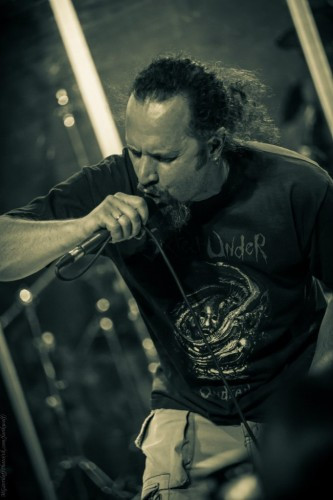

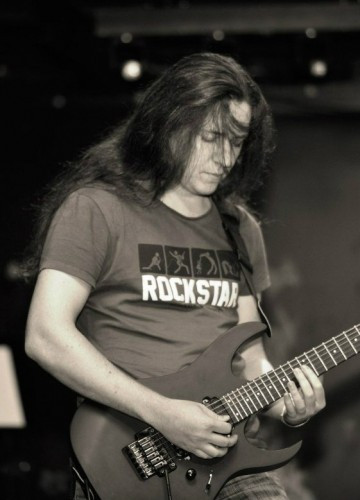
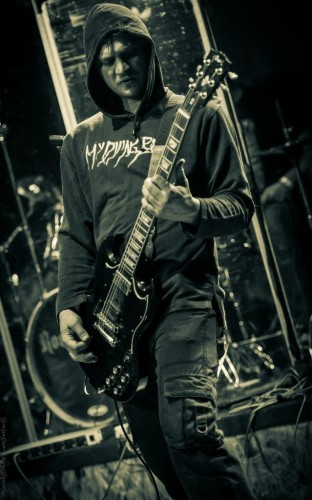
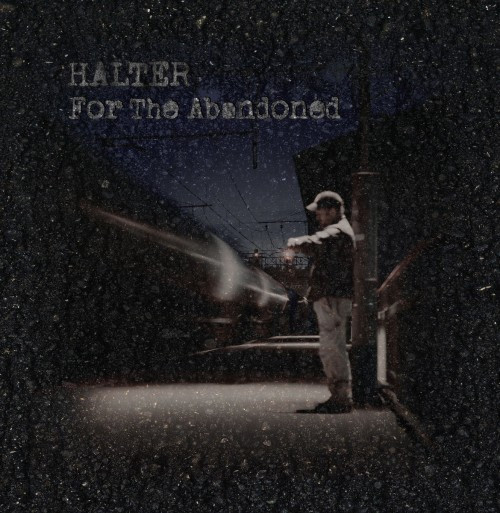
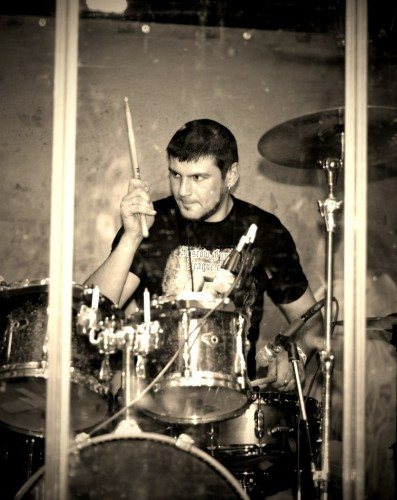

Had the privilege of co-hosting an internet radio show together with Alexey, presenting this album as well as playing a couple of tracks he picked. Really chill dude with a solid taste in music!
Thank you mate for that! New album is awesome, and Alexey surely is fair gentleman who have something to say.